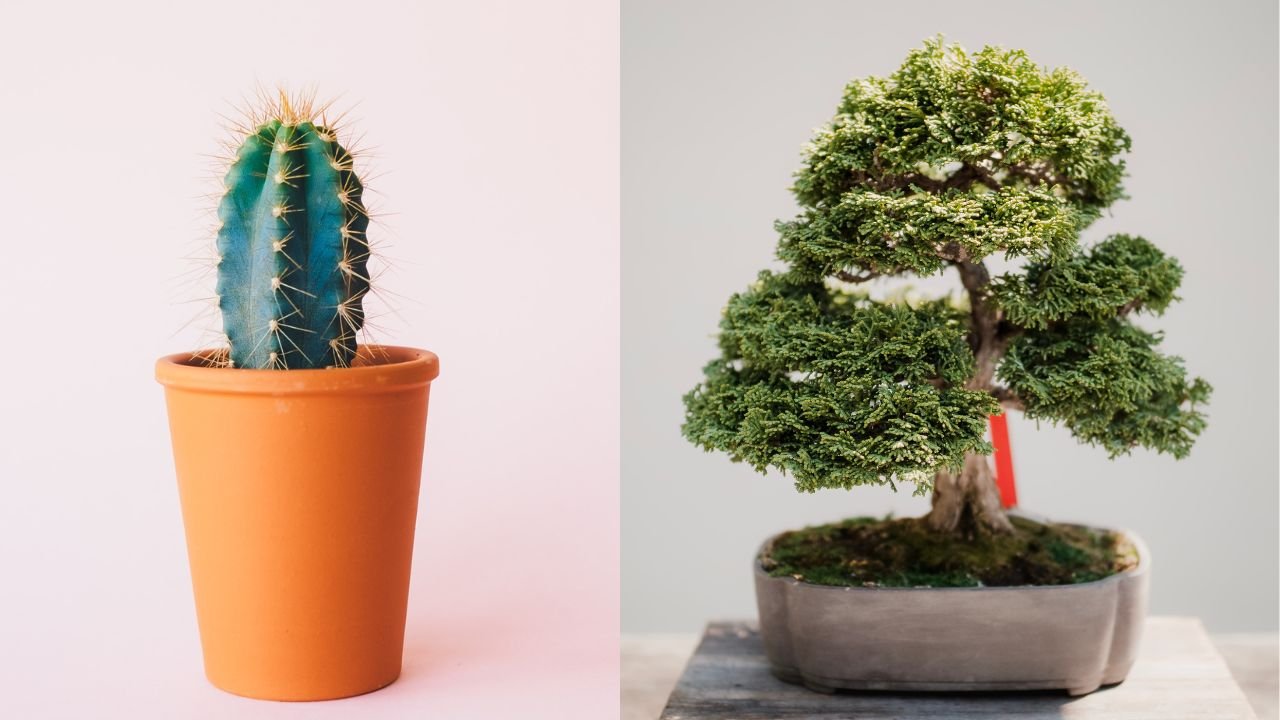8 Plants to avoid at home according to Vastu Shastra are listed below. There are few plants that may attract negative energy into your home. If you’re curious to know read below.
Cactus
According to Vastu Shastra, cacti is one of the plant to avoid keeping at home.They are believed to carry negative energy into homes due to their prickly and sharp thorns. These thorns are thought to harbor negative energies, potentially bringing bad luck, stress, and anxiety to the family. While cacti may seem visually appealing, both Vastu and Feng Shui experts caution against having them in your home, as they can radiate unfavorable energy.
Despite these concerns, it’s not necessary to completely rule out having a cactus plant at home. Placing them in specific locations can actually yield benefits. For instance, when positioned on the terrace or near windows, cacti are believed to counteract incoming negative energy, effectively assuming a protective role for your home.
Bonsai Plant
Vastu Shastra discourages the use of bonsai plants at home, despite their visual appeal. Bonsai’s inhibited growth can disrupt inhabitants’ life cycles, potentially leading to career or business slowdowns. In terms of Vastu, bonsai’s inclusion as home decor isn’t considered auspicious. Bonsai experts advise against indoor placement, suggesting they belong in more open spaces like gardens or verandas. While bonsai signifies harmony and balance globally, it’s linked to sluggish growth. Placing bonsai outdoors exposes them to natural seasons, aligning with typical tree growth, if one chooses to cultivate them.
Cotton Plant
Indoor usage of cotton plants, particularly silky cotton plants, is discouraged. Despite their charming appearance as decorative elements, they are not favored according to Vastu Shastra. These snowy white plants are deemed inauspicious and are believed to attract bad luck when placed indoors. While there’s a variety of Vastu-approved plants for homes, cotton, and silky cotton plants don’t make the cut due to their negative connotations.
Tamarind plant
Tamarind plants are thought to draw negative energy, making it advisable to avoid planting them near or inside your home. Their presence could potentially attract unfavorable influences and disturb mental tranquility, in accordance with Vastu Shastra.
Mehendi plant
It is advised to avoid keeping Myrtle or Mehendi plants at home due to the belief that they might harbor evil spirits and emit strong fragrances, potentially disrupting the home’s atmosphere and mental peace.
Date Palm Tree
The date palm tree is frequently linked with financial challenges. According to Vastu principles, purchasing a home with this tree can result in financial difficulties and potentially harm the family’s health. While a full-grown date palm can enhance the surroundings, an indoor variety exists for small spaces with ample light and soil. Despite this, Vastu cautions against planting date palm trees indoors, as it is believed to bring about poverty and financial instability.
Plants that release milky substance
Plants that release a milky substance when their branches are broken are believed to carry negative energy and should be avoided for planting near or around homes. This prohibition extends to milk-producing trees such as banyan and peepal, as advised by Vastu expert.
Dead and Decaying plants
Having any form of deceased or deteriorating plant within a residence is inadvisable. Plants chosen for indoor settings should display vitality, vibrant greenery, and the potential for blossoms and fruits. If you decide to maintain plants indoors, ensure they receive ample water and sunlight to nurture their growth. It’s crucial to promptly eliminate any lifeless or deteriorating plants from your home. Similarly, dried flowers are deemed inauspicious and should be promptly discarded.

